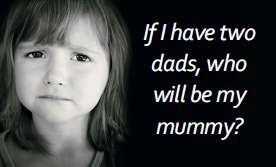Same-Sex Marriage Isn’t Good for Kids
 Public Discourse 14 April 2015
Public Discourse 14 April 2015
Dear Justice Kennedy,
Earlier this year I wrote you a letter, “Dear Justice Kennedy: An Open Letter from the Child of a Loving Gay Parent.” My letter has now been quoted (and criticized) by the Family Equality Coalition (FEC) and COLAGE (Children of Lesbian and Gays) in the amicus brief they have filed in support of same-sex marriage. The brief is filled with quotations from children with gay or lesbian parents asking the court to redefine marriage for the entire country so that their two moms or two dads could get married.
The authors argue that the only struggle these children face is the lack of “marriage equality.” Perhaps for some children of LGBT couples that is the case. But something stood out to me when I read this brief. It wasn’t what the brief said—on the contrary, it was a glaring omission that caught my attention.
Despite the fact that every child who is quoted in that brief has at least one parent who is not present in their home, none of them talk about the process of separation that led to their being raised in a same-sex household. When you are talking about same-sex parenting, there is always more to the story. Heather Barwick, who was raised by two moms, and I have filed our own amicus brief telling the rest of that story.
The Inherent Problem with Same-Sex Parenting
The FEC Brief states: “The major challenge most same-sex-parented families must surmount is nothing inherent in their family structure, but rather the societal and governmental disapproval that the challenged state laws represent and perpetuate.” It speaks of how children of same-sex parents are “psychologically burden[ed]” because “their parents aren’t able to get married.”
While I recognize that these children really are feeling burdened, I have a hard time believing that a lack of “marriage equality” is the primary struggle that most of these children face. If a parent conceives a child with a member of the opposite sex—or enters into a contract to purchase sperm or eggs from the child’s biological parent—and then chooses to raise that child with an unrelated adult of the same sex, that child’s life is going to be complicated in ways we are just beginning to realize.
FEC quoted children in situations similar to that of twelve-year-old Annalise, my daughter’s friend, whose father abandoned their family for his lover when she was four. A few years later, Annalise was photographed in the wedding of her “two dads,” who were effusively congratulated on the “family that they had made together.” Though Annalise is careful to say that she loves her father and his partner, she recently wrote an essay on the pain and confusion that has filled her life since her father left the family and married her other dad.
I understand and deeply identify with the desire to defend one’s parents. Nonetheless, it is not the state’s fault these children are suffering a “psychological burden,” nor can the state ever relieve such a burden. Many children find themselves in same-sex-headed households because their parents have made decisions to separate them from one of their natural parents. Some may feel burdened because they long for a parent who they are told is unnecessary. Some may have adults in their lives who may not acknowledge their loss at all, which imposes a burden of confusion, anger, and pain.
My amicus brief co-author, Heather Barwick, describes her experience this way:
I grew up surrounded by women who said they didn’t need or want a man. Yet, as a little girl, I so desperately wanted a daddy. It is a strange and confusing thing to walk around with this deep-down unquenchable ache for a father, for a man, in a community that says that men are unnecessary. There were times I felt so angry with my dad for not being there for me, and then times I felt angry with myself for even wanting a father to begin with.
Despite the popular cultural marketing that all kids need are “two loving, stable adults,” not every child is buying it. It’s alien to their real-life experience. This is how one adolescent, with the safety of anonymity, expressed it:
Am I a bad daughter because I wish I had a Dad? Is there anyone else who has 2 Moms or 2 Dads who wonders what it would be like if they were born into a normal family? Is there anyone else who wants to be able to use the word normal without getting a lecture on what is normal???
http://www.thepublicdiscourse.com/2015/04/14813/?utm_source=The+Witherspoon+Institute&utm_campaign=1a160bf832-RSS_EMAIL_CAMPAIGN&utm_medium=email&utm_term=0_15ce6af37b-1a160bf832-84094405






